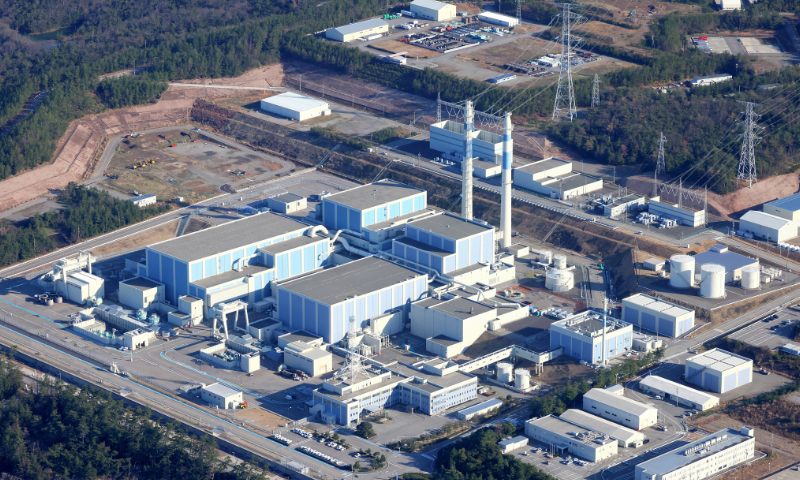Suspicions linger over safety of Japanese nuclear power plants after oil leakage following Noto quakes

In the aftermath of the 2024 Noto Peninsula Earthquake, oil leakage from the affected equipment at the Shika Nuclear Power Plant (Shika plant) in the most-affected central Japanese prefecture of Ishikawa was over five times higher than initially disclosed, arousing another wave of doubts and concerns among public and insiders over the safety of the nuclear power plants in the quake-prone Japanese areas.
Although Hokuriku Electric Power Company (HEPCO), the operator of the Shika plant, claimed that the leaked oil has no negative effects and external radiation levels remain unaffected, insiders on Tuesday questioned the company's credibility and transparency considering no evidence of their claims has been provided to the public.
Also, they worry that the damages caused by the Noto quakes at nuclear power plant could be worse than initially disclosed. Many are worried that the Shika plant will be a repeat disaster of the Fukushima nuclear incident.
The Shika plant, located 65 kilometers from the epicenter, has already reported temporary power outages, oil leaks at transformers and water spill-over from nuclear fuel pools.
HEPCO said in the latest statement published on Tuesday that "there was no damage to the [nuclear power] equipment that would pose a safety issue. Additionally, there are no changes in the readings from the monitoring posts installed at the [nuclear] power plant, and there is no impact of radioactivity on the outside world." But it failed to provide relevant specific data and a report of the incident.
Earlier this week, HEPCO stated that due to the earthquake's impact, two external power supply transformers for Units 1 and 2 at the Shika plant were damaged. One transformer for Unit 2 was reported to have leaked approximately 3,500 liters of oil, rendering a portion of the external power supply system inoperable, according to the Xinhua News Agency on Saturday.
However, the company admitted on Friday that the actual oil leakage amounted to as much as 19,800 liters, and the timeline for repairing the external power supply system remains uncertain.
Multiple Japanese media outlets reported that the company is recovering the leaked oil.
Another transformer for Unit 2 at the plant has been found to have leaked approximately 100 liters of oil, HEPCO added.
Moreover, there have been reports of ground subsidence around the reactor building of Unit 1, though the company assured that these conditions will not impact the safety of the Shika plant.
However, local media reported that there were "explosion sounds and a burning smell" near the transformer for Unit 2 at the plant. The power company explained that these were the sounds of the automatic fire suppression system.
Given the stained history of mistakes, concealment and deception made by certain Japanese electric power companies including the Tokyo Electric Power Company, the public seem to have lost trust in these companies.
The HEPCO claimed the leaked oil was used for insulation and cooling and has no negative health and environmental impact. However, whether the oil has been contaminated by the nuclear radioactive substances, whether the oil leakage would affect the operation of nuclear power plant and cause radiation leakage, and whether the HEPCO has fully recovered the leaked oil from the sea remain unclear, said law professor Chang Yen-chiang, who is also the executive director of the Yellow Sea and Bohai Sea Research Institute at Dalian Maritime University.
Chang told the Global Times on Tuesday if HEPCO fails to fully recover the leaked oil in time and prevent it from spreading and polluting the maritime environment, the company may be in violation of the "Convention on the Prevention of Marine Pollution by Dumping of Wastes and Other Matter 1972", the "London Convention" for short, and the United Nations Convention on the Law of the Sea.
If there is a similar situation between this Shika plant and Fukushima Daiichi nuclear power plant, what is most worrying is the potential dumping of contaminated water from Shika plant as the contaminated water could be dumped directly into the Sea of Japan, reaching the coast of China. Given that the Sea of Japan is a semi-enclosed sea, the self-purification capacity of such sea is much weaker than that of an open ocean. So once the contaminated water is discharged, the radioactive contamination will last longer in and around the sea, according to Chang.